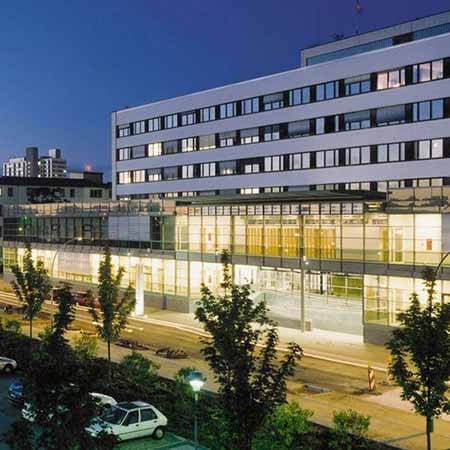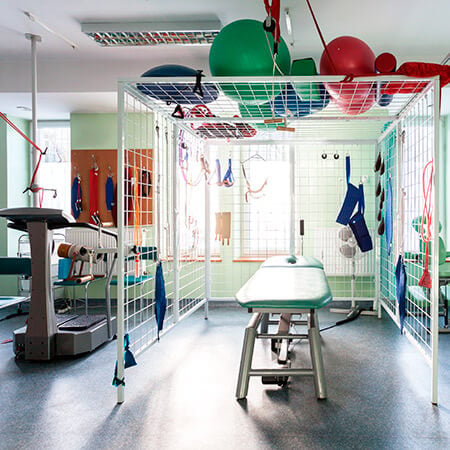Meningitis
Meningitis is a life-threatening inflammatory disease that affects the brain membranes. This illness can occur at any age, including children under 1 year. Bacterial meningitis is the most dangerous. Lethality varies from 10 to 15% in different countries. Meningitis demands the timely diagnostics and treatment to save patient’s life and prevent the irreversible neurological defects.
The Booking Health portal presents 53 German clinics specializing in meningitis treatment
Show all clinics
Meningitis – Diagnostics
The main role in the diagnosis of meningitis belongs to the examination of the cerebrospinal fluid. Also, nasopharyngeal mucus may be used as biological material for the analysis.
The lumbar puncture is prescribed in order to take the spinal fluid for analysis. A needle is injected into the lumbar spine section. Bone marrow ends there, so there is not risk of damaging it.
The following characteristics of the cerebrospinal fluid indicate the meningitis:
- Increased cerebrospinal fluid pressure
- Fluid is turbid, of yellowish or greenish color in the case of the purulent meningitis
- Pleocytosis, which is a significant increase of cells amount in the cerebrospinal fluid (neutrophils or lymphocytes)
- Increased level of protein (purulent meningitis)
- Low level of glucose
Usually, it’s not difficult to detect meningitis in a patient. Doctor’s main task at the diagnostics stage is to identify what pathogen have caused the illness, as the treatment program depends on it.
The following diagnostics options are applied to identify bacteria or viruses in liquor:
- Bacterioscopy (the study of biological material under a microscope)
- Bacteriological examination (sowing on the nutrient media)
- PCR (polymerase chain reaction, allows to reveal the DNA or RNA of the pathogen)
- Latex agglutination reaction
- Counterimmunoelectrophoresis
- Fluorescent antibody technique
- Fluorescence reaction
- The reaction of immobilization of pale treponema
Immunoenzymatic analysis and the indirect hemagglutination reaction are rarely performed, as time is required for these examinations, and meningitis can proceed quite quickly. Linked immunosorbent assay is performed when the doctor suspects the tuberculosis.
MRI is applied to find the meningitis complications (hydrocephalus, brain abscess, thrombosis of venous sinuses).
Meningitis – Treatment
Meningitis is treated with conservative methods. The etiotropic, pathogenetic and symptomatic therapy are prescribed for the patient.
Etiotropic therapy is aimed at the destroying of the infection. The elimination of the disease cause leads to the patient's recovery.
Different medicines are prescribed depending on the type of pathogen:
- Bacterial meningitis requires penicillin antibiotics, cephalosporins and also carbapenems as the reserve drugs (if other antibiotics are ineffective)
- Tuberculous meningitis requires several medicines: streptomycin, ethambutol, isoniazid; rifampin is added if necessary
- Viral meningitis doesn’t usually require causal treatment, but interferons and glucocorticoids can be indicated for patients with the severe forms
- Protozoal meningitis is treated with sulfadimidine and chloridin
- Fungal meningitis requires administration of amphotericin B and 5-flucytosine
Pathogenic therapy aims at the elimination of the consequences of the causative agent presence in patient’s brain membranes and at the support of vital functions. The therapy is selected depending on the clinical situation.
Main directions of the pathogenic therapy are:
- Detoxification
- Control of blood electrolytes level and its timely correction
- Control of intracranial pressure
- Prevention of brain edema
- Prevention or relief of infectious-toxic shock
- Neuroprotective therapy (to protect the brain from permanent damage)
- Struggle with hemorrhagic syndrome
Symptomatic medicines are also used. The purpose of their prescription is to improve patient’s tolerance to the basic treatment, improve quality of life during the treatment course and relieve his suffering.
Painkillers, sleeping pills, and diazepam (against seizures) are prescribed. Vitamins and general tonic medicines are administered, as well.
Best clinics for the meningitis treatment in Germany:

Beta Clinic Bonn

Bundeswehr Hospital Berlin

Charite University Hospital Berlin
Meningitis – Rehabilitation
The most modern rehabilitation programs are used in Germany. They are adapted individually for each patient, and are based on the disease stage, age, physical possibilities, and the results of treatment. Different specialists such as: therapists, neurologists, psychologists, rehabilitators, kinesiotherapists, physiotherapists are involved in the rehabilitation process.
The following methods of rehabilitation are used:
- Dosed physical activity
- Training on the simulators and in the pool
- Individual orthoses
- Physiotherapy
- Acupuncture
- Manual therapy
- Transcranial magnetic stimulation
- Natural factors of the nature (mud, thermal waters, etc.)
- Individual or group therapy with a psychologist
Rehabilitation may include medicamentous support. It is necessary to hold a consultation with the patient about the proper nutrition and the way of life which is important for him in the current situation.
Rehabilitation programs in Germany are designed for 2 weeks. If necessary, they can last much longer. In this country, the patient is provided with qualitative care, accommodation in comfortable rooms and individually selected meals.
Rehabilitation programs in Germany show one of the best results in the world. Most patients successfully restore their working capacity and excellent health there. They remain physically active, return to the full social and family life.
Best clinics for neurological rehabilitation in Germany:
Author:
The article was edited by medical expert, board certified Dr. Nadezhda Ivanisova. For the treatment of the conditions referred to in the article you must consult a doctor; the information in the article is not intended for self-medication!
Source:
The cost of services includes
Here you can find the cost of treatment for this disease at the German University Hospitals. Leave a request and we will provide a free consultation with a doctor and will start organizing the whole treatment process.
The program includes the following:
- Issuing of an invitation for getting a visa for treatment as quick as possible
- Fixing an appointment at a time convenient for you
- Preliminary organization of a comprehensive examination and discussion of the forthcoming treatment plan
- Arranging transfer from the airport to the hospital and back to the airport
- Provision of interpreting services and services of a personal medical coordinator
- If necessary, assistance in the organization of further surgical treatment
- Provision of a medical insurance against treatment complications covering up to 200,000 euro
- Preparation and translation of medical records and recommendations from the hospital
- Assistance in the subsequent communication with your attending physician, including consultations on repeated X-ray images through the unique medical document management system E-doc


